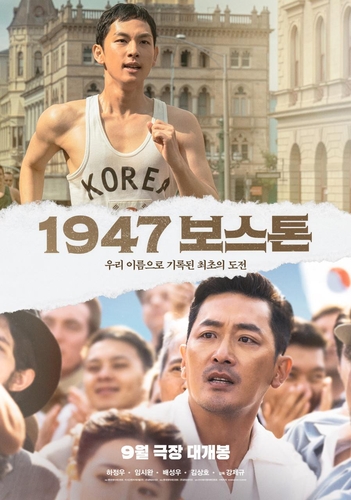- California Assembly OKs highest minimum wage in nation
- S. Korea unveils first graphic cigarette warnings
- US joins with South Korea, Japan in bid to deter North Korea
- LPGA golfer Chun In-gee finally back in action
- S. Korea won’t be top seed in final World Cup qualification round
- US men’s soccer misses 2nd straight Olympics
- US back on track in qualifying with 4-0 win over Guatemala
- High-intensity workout injuries spawn cottage industry
- CDC expands range of Zika mosquitoes into parts of Northeast
- Who knew? ‘The Walking Dead’ is helping families connect
‘Road to Boston’ sheds light on Korean marathon hero
Director Kang Je-gyu’s new period film “Road to Boston” tells a heartwarming drama based on the true story of a Korean athlete who became the first Asian winner of the Boston Marathon in 1947.
The story follows Suh Yun-bok (1923-2017), played by Im Si-wan, as he competes in the Boston Marathon bearing the Korean flag for the first time after his country’s liberation from the 1910-45 Japanese colonial rule.
Suh set the then world record with a time of 2:25:39 at the age of 24, becoming the first Asian champion to win the prestigious sporting event, which was founded in 1897.

His coach was Sohn Kee-chung (1912-2002), played by Ha Jung-woo, another iconic Korean athlete and the winner of the marathon at the Berlin Olympics in 1936, when Korea was a colony of Japan.
Director Kang, best known for “Shiri” (1999) and “Taegukgi” (2004), both of which dealt with dark moments in Korean history, said he tried to stay faithful to the historical records of the marathoners.
He said he focused on designing the 42.195-kilometer marathon course and the actors’ embodiment of the marathoners for authentic portrayal of the real event.
“As it is a film based on true stories, I wanted to portray their stories as faithfully as possible,” Kang said in a press conference on Thursday.

Ha interpreted Sohn as an athlete who had to endure pain after running with the Japanese flag on his chest. During the award ceremony at the 1936 Berlin Olympics, the champion was spotted hiding the Japanese flag with an oak tree.
“I think Sohn carried enormous pain in his heart for a long time. He endured a difficult time of oppression and persecution for covering the Japanese flag at the award ceremony,” Ha said.
Im, who lowered his body fat percentage to 6 percent through intensive physical training, said he joined the project with the mindset of a national athlete.
“I thought I should approach the role with the mindset of a national athlete bearing the Korean flag, just like Suh did,” Im said. “Through this project, I learned the joy of running and picked up a healthier hobby. That’s how special this work is to me.”











